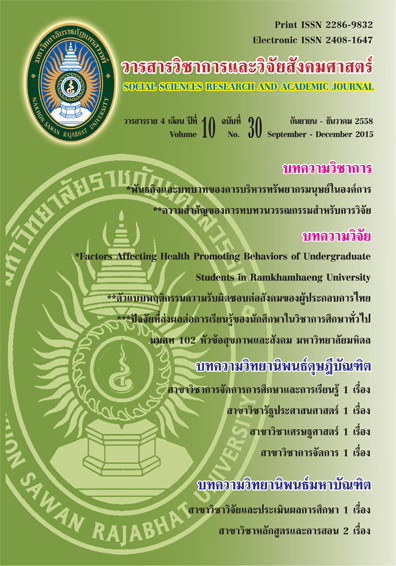ปัจจัยที่มีอิทธิพลต่อพฤติกรรมการสร้างเสริมสุขภาพของ นักศึกษาระดับปริญญาตรีมหาวิทยาลัยรามคำแหง; Factors Affecting Health Promoting Behaviors of Undergraduate Students in Ramkhamhaeng University
Main Article Content
Abstract
บทคัดย่อ
จุดมุ่งหมายของการศึกษานี้คือ ต้องการศึกษาปัจจัยที่มีอิทธิพลต่อพฤติกรรมการสร้างเสริมสุขภาพของนักศึกษามหาวิทยาลัยรามคำแหง
การศึกษานี้เป็นการสำรวจแบบภาคตัดขวาง ได้รวบรวมข้อมูลจากนักศึกษาปริญญาตรีจำนวน 329 คน ที่ลงทะเบียนเรียนในกระบวนวิชาที่เปิดสอนในภาควิชาพลานามัย คณะศึกษาศาสตร์ มหาวิทยาลัยรามคำแหง ในปีการศึกษา 2558 เครื่องมือที่ใช้เป็นแบบสอบถามโดยเก็บข้อมูลส่วนบุคคล และปัจจัยต่าง ๆ ได้แก่ พฤติกรรมการสร้างเสริมสุขภาพในอดีต การเห็นคุณค่าตนเอง การรับรู้ประโยชน์ การรับรู้อุปสรรค การรับรู้ความสามารถตนเอง อารมณ์ที่เกี่ยวข้องกับการปฏิบัติพฤติกรรมสุขภาพ การสนับสนุนทางสังคม สถานการณ์/สิ่งแวดล้อมในการปฏิบัติพฤติกรรมการสร้างเสริมสุขภาพ ความยึดมั่นในแผนการปฏิบัติการสร้างเสริมสุขภาพ และพฤติกรรมการสร้างเสริมสุขภาพ ความสัมพันธุ์เชิงสาเหตุระหว่างตัวแปรในโมเดลถูกวิเคราะห์โดยใช้วิธีการวิเคราะห์เส้นทางความสัมพันธุ์เชิงสาเหตุ ภายใต้กรอบแนวคิดของโมเดลการสร้างเสริมสุขภาพของเพนเดอร์
ผลการศึกษา: โมเดลการสร้างเสริมสุขภาพที่ปรับในขั้นสุดท้ายมีค่าดัชนีความสอดคล้อง (fitness index) ตามเกณฑ์ที่กำหนด ผลการศึกษาพบว่า ปัจจัยสำคัญที่มีอิทธิพลโดยตรงต่อพฤติกรรมการสร้างเสริมสุขภาพ (HPB) ได้แก่ การรับรู้ความสามารถตนเอง (HEF) การรับรู้ประโยชน์ (HBF) พฤติกรรมการสร้างเสริมสุขภาพในอดีต (PHB) การสนับสนุนทางสังคม (SS) ความยึดมั่นในแผนการปฏิบัติการสร้างเสริมสุขภาพ (CHP) และการรับรู้อุปสรรค (HBA) ซึ่งมีอิทธิพลทางลบต่อพฤติกรรมการสร้างเสริมสุขภาพ สำหรับปัจจัยที่มีอิทธิพลทางอ้อมต่อพฤติกรรมการสร้างเสริมสุขภาพ ได้แก่ พฤติกรรมการสร้างเสริมสุขภาพในอดีต โดยผ่านปัจจัยการรับรู้ความสามารถตนเอง ผ่านปัจจัยการสนับสนุนทางสังคม และผ่านปัจจัยการรับรู้ประโยชน์ โดยภาพรวมปัจจัยทั้ง 6 สามารถอธิบายความแปรปรวนของพฤติกรรมการสร้างเสริมสุขภาพได้ร้อยละ 64 (R2 = 0.64)
ผลการวิจัยของการศึกษานี้พบว่า โมเดลการสร้างเสริมสุขภาพของเพนเดอร์สามารถทำนายพฤติกรรมการสร้างเสริมสุขภาพของนักศึกษาในระดับปริญญาตรีของมหาวิทยาลัยรามคำแหงได้ดี ข้อมูลจากผลการศึกษานี้ โดยเฉพาะข้อมูลปัจจัยการรับรู้ความสามารถตนเอง และการรับรู้ประโยชน์ในการปฏิบัติพฤติกรรมการสร้างเสริมสุขภาพ จะเป็นประโยชน์สำหรับอาจารย์ที่พัฒนาหลักสูตร และนักสุขศึกษา สามารถวางแผนในการพัฒนาโปรแกรมการสร้างเสริมสุขภาพที่ช่วยสนับสนุนให้นักศึกษาเห็นประโยชน์และมีความเชื่อมั่นในความสามารถตนเองที่จะปฏิบัติพฤติกรรมการสร้างเสริมสุขภาพจนเป็นนิสัยที่ดี
Abstract
The aim of this study was to determine the predictors of health-promoting behaviors among Ramkhamhaeng University students.
This study was a cross-sectional survey. Data were collected from 329 undergraduate students who enrolled in the physical education courses in the Physical Education Department, Faculty of Education, Ramkhamhaeng University in academic year 2015. The instruments were questionnaires including a demographic section, prior health promoting behaviors, self esteem, perceived health benefits, perceived health barriers, perceived health self efficacy, affect related to health promoting behavior, social support, situation/environment to health promoting behavior, commitment to use of health promotion, and health promoting behaviors. All causal correlations among the variables in the model were examined using path analysis within Pender’s health promotion modeling framework.
Results: The final health promotion model revealed a good model-data fit which followed the fitness index criteria. The results indicated that the important factors directly affected health promoting behaviors were perceived health self efficacy (HEF) perceived health benefit (HBF), prior health promoting behavior (PHB), social support (SS), commitment to use of health promotion (CHP), and perceived health barriers (HBA) which negatively affected health promoting behaviors. The factors indirectly influenced health promoting behaviors were prior health promoting behavior via perceived health self efficacy, via social support, and via perceived health benefits. In overall, the significant six factors could explain 64 percent of the variance in health promoting behaviors (R2 = 0.64).
The findings of this study showed that Pender’s health promotion model could predict health promoting behaviors among undergraduate Ramkhamhaeng University students well. The results provided information, especially, perceived health self efficacy and perceived health benefit, which are useful for curriculum planners, and health educators to develop health promotion programs that encourage students to learn the benefits and are confident in their own ability to practice good health habits.


